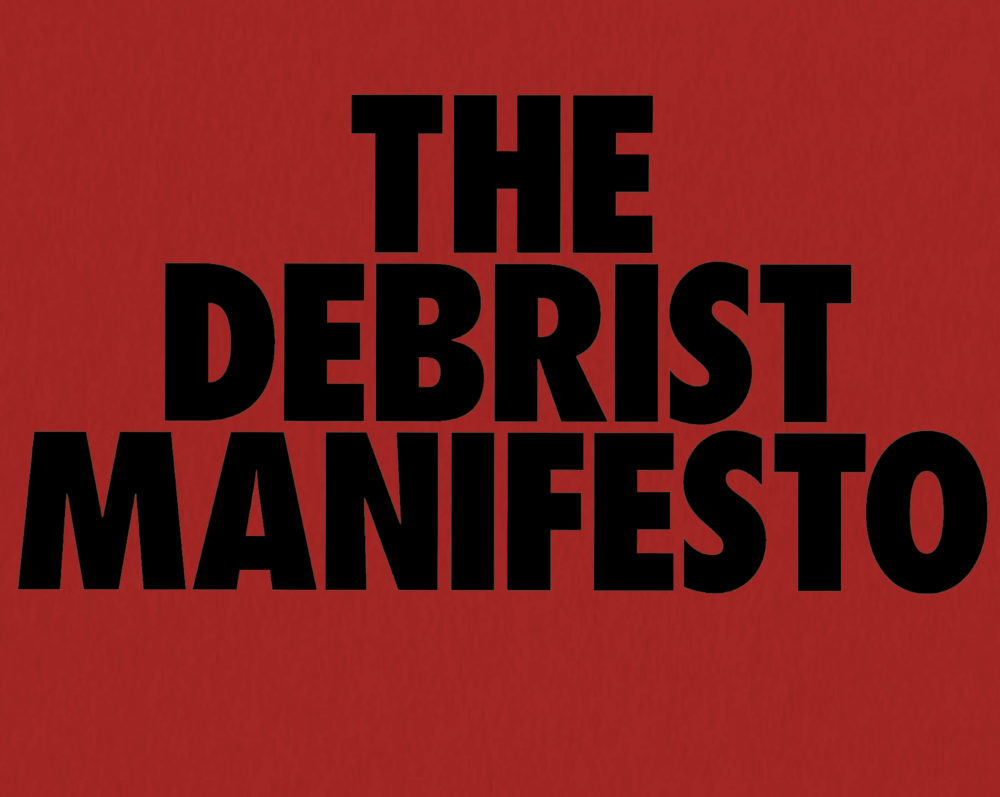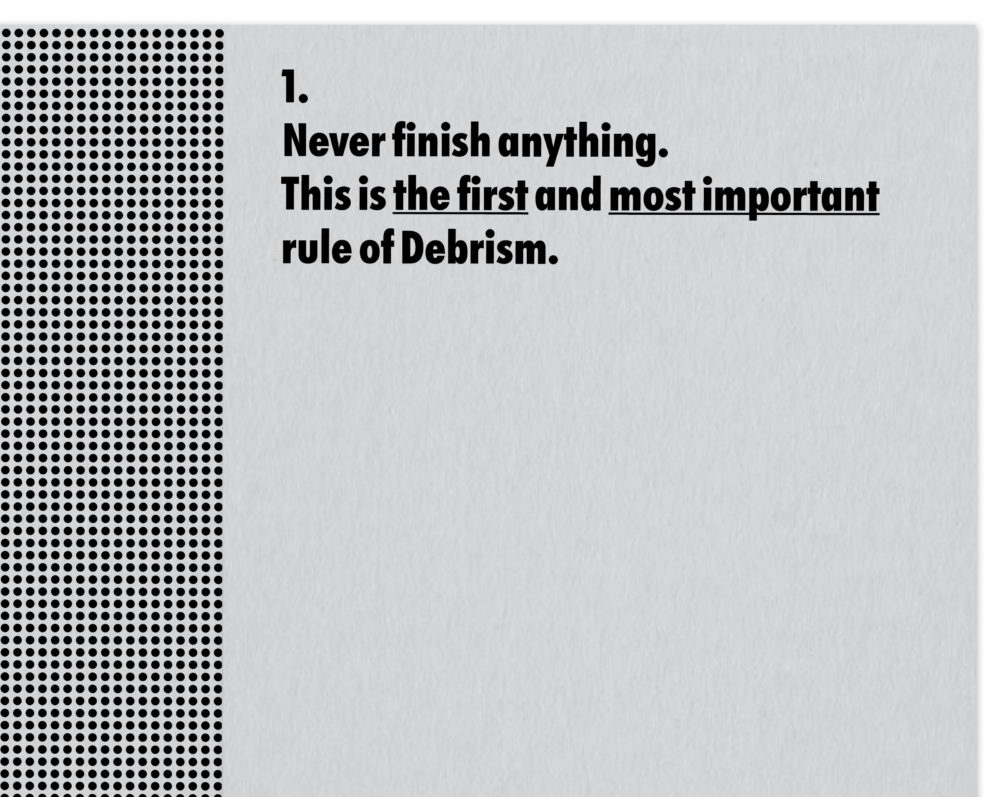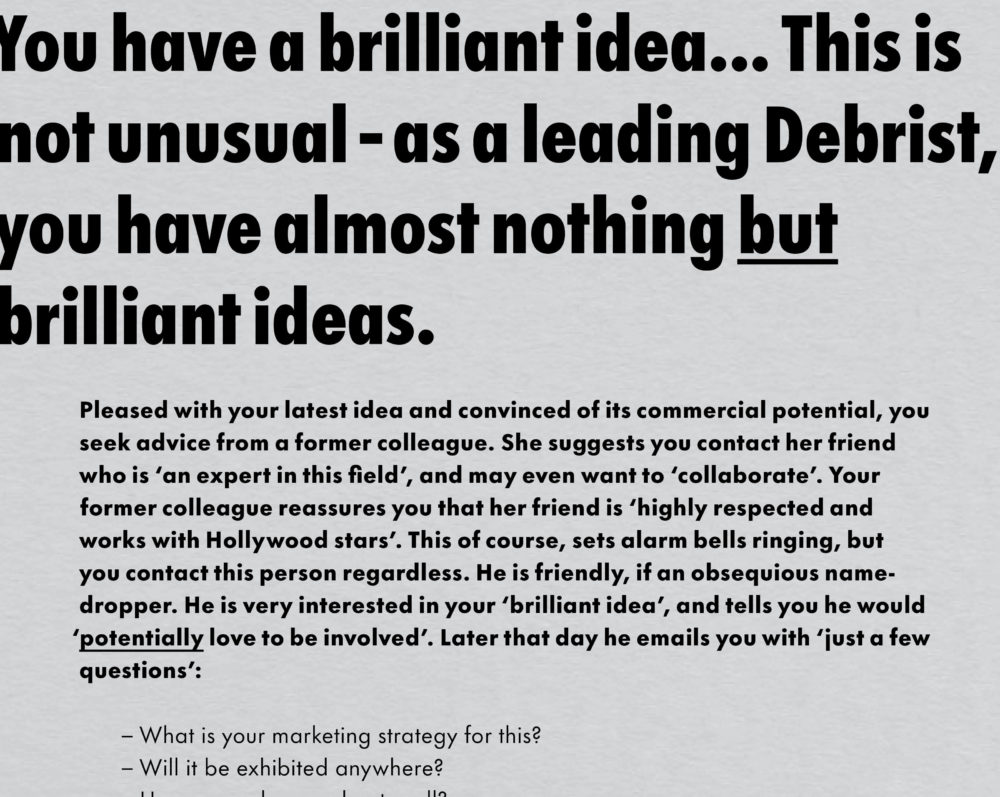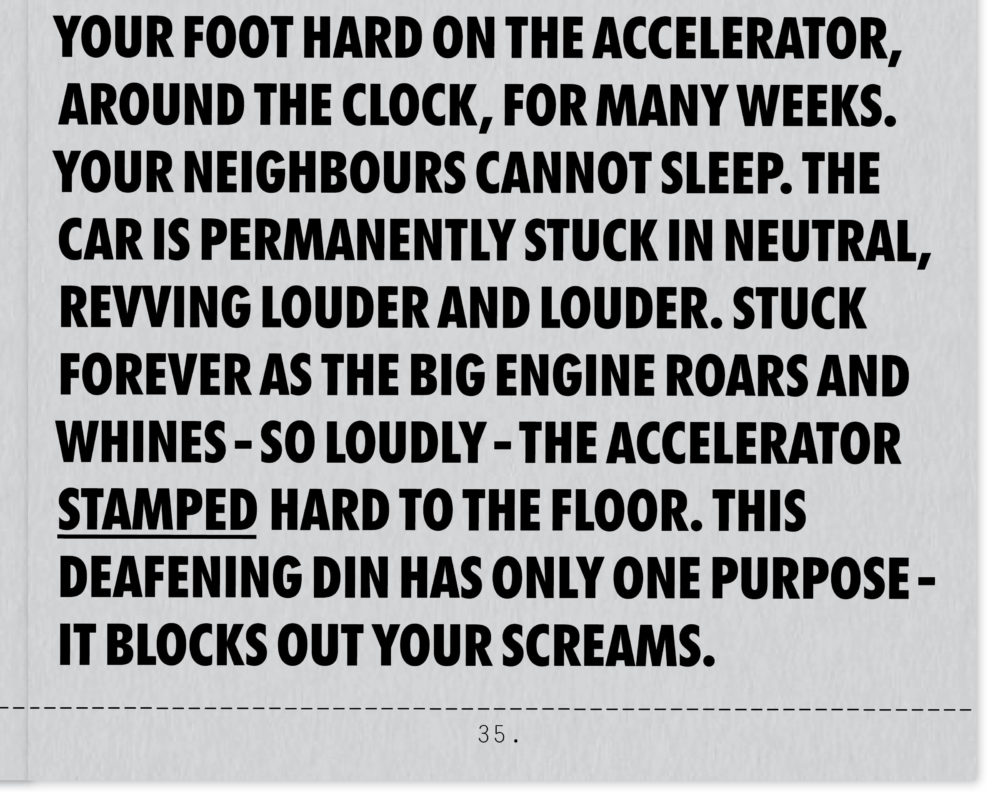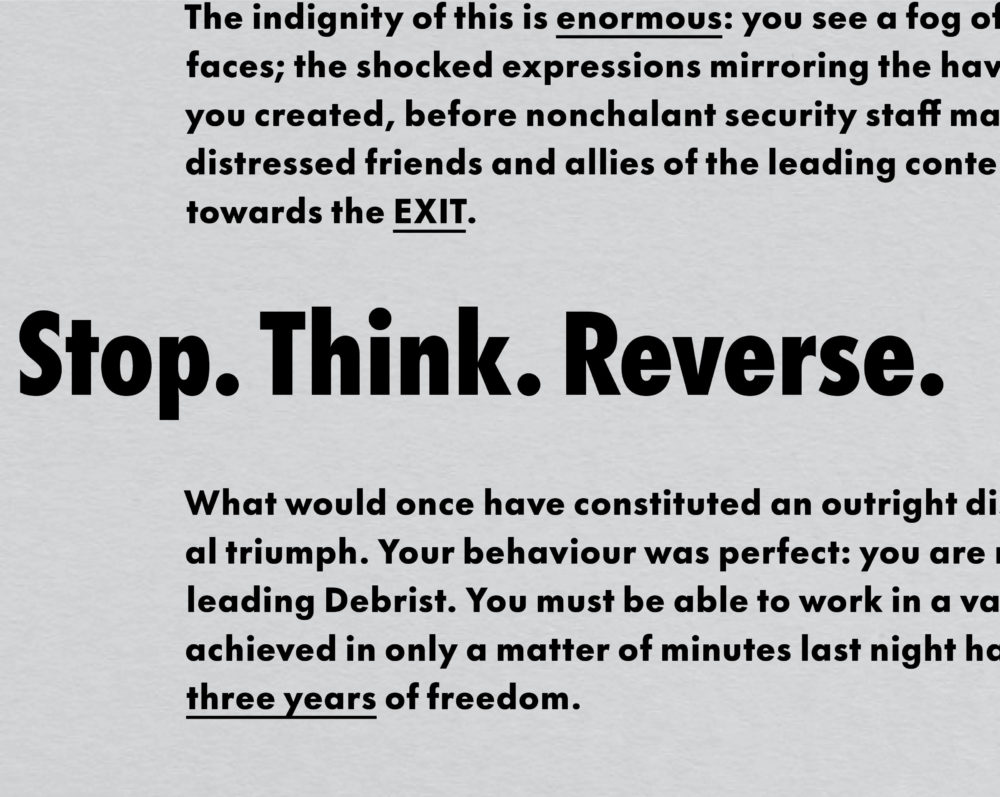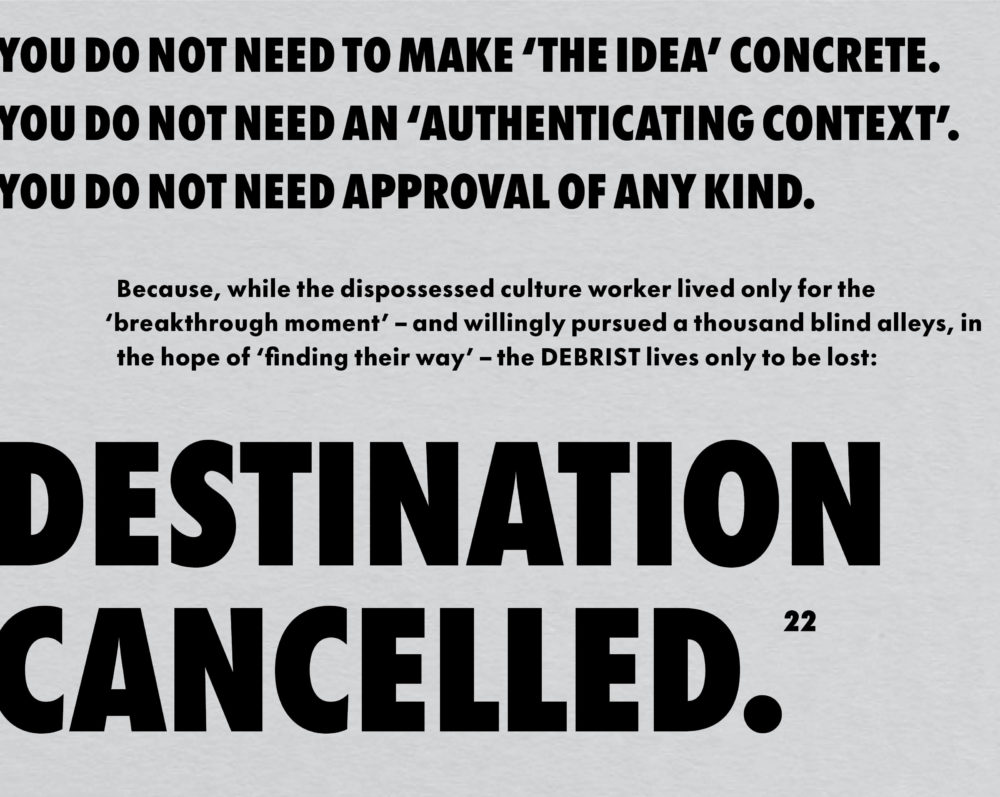Crying for Mommy
Scott King Discusses His Manifesto on Embracing Inaction
Here, artist Scott King talks to writer Jon Savage about King’s new work. The Debrist Manifesto is a ten thousand word “guide book” on art world failure, inaction, popularity, identity, and the pursuit of perfectionism in a world that doesn’t care.
———
JON SAVAGE: You seem to like the manifesto form.
SCOTT KING: I do. It’s a fantasy isn’t it? To write and believe in your own manifesto, to reset the rules, to begin again. For as long as I can remember—well, since I went to art school thirty years ago—I have always wanted to write a manifesto, to somehow attempt to change the rules so that they’d work in my favor. I’ve had this idea, to write The Debrist Manifesto, for quite a long time. I made many attempts to write it before this one, and all those attempts failed, which of course is very Debrist in itself.
SAVAGE: The Debrist Manifesto reads like a Situationist text—Debrist Guy Debord. Are the Situationists an inspiration?
KING: Everything I do seems to be influenced by them, whether it’s intentional or not. I think a lot of my work is really a form of détournement, you know, taking an existing or familiar form and twisting it around, hijacking and reloading the familiar with your own content: like the “self-help” book I did, Anxiety & Depression (JRP|Ringier 2009), which was really a rewriting of those standard “mind over mood”-type therapy books, but loaded up with my own tales of misery and disaster. Or the graphic novel I did with Will Henry, Anish and Antony Take Afghanistan (JRP|Ringier 2014), which has the British artists Anish Kapoor and Antony Gormley attempt to “rescue” Afghanistan by building hundreds of huge public sculptures across it. So, I’ve often taken a form that is familiar to everybody, and maybe one I really have no interest in or think is quite banal, like the self-help book or the graphic novel, and then used it to my own ends. But I think this manifesto is different—the manifesto as a form is quite different. There’s really nowhere to hide when you write a manifesto, is there? So even though, in some respects, The Debrist Manifesto started out as a satire on my own position—my own failure to complete projects, to get more work, to be “in demand.” Once I got past the first few points, I realized that I was actually telling the truth. I mean, there are fantastical and ridiculous or comic elements to it, but it is underpinned by the truth. It’s a genuine attempt to reconsider failure as success, illustrated by both farce and truth, and I think that’s a particularly Situationist trait: offering up the ludicrous in order to unveil a truth.
SAVAGE: The Debrist Manifesto is scathing about the media world. Is that from personal experience or just from observation?
KING: I think it’s scathing about both the media world and the art world, and it comes from personal experience. It’s embittered, but it also attempts to offer a solution (Debrism). I wrote about these ‘worlds’ because they are the ones that I know, but I think the manifesto is written in such a way that anyone reading it can apply the rules or examples to their own world. It’s about being a dreamer in many respects, and I think everyone dreams of doing something else, don’t they? Almost everyone spends huge chunks of their lives wishing they were somewhere else doing something else. The manifesto addresses this. It’s a study of frustration. I try to ask the question, “Do you really want to be a successful author, or musician, or artist?” I mean we, the privileged West, live in a world that is now ruled by celebrity, where popularity is everything. We’ve reached a point of identity tragedy: We wake up in the morning and the first thing we do is check Instagram to see if we still exist. So, the manifesto, ultimately, is about embracing “failure,” embracing a lack of popularity, and looking for the excitement and potential within that rather than being in a state of constant frustration because you do not have what it is you think you want. It is about embracing what you do have, even if that seems like shit. I think that’s exciting. There is a freedom within that.
SAVAGE: In a way, it’s an anti-success handbook, the direct opposite of all those self-improvement guides. Is that deliberate?
KING: I’d say it’s an “anti what you currently perceive to be success handbook.” Someone else suggested that it could have been called How To Be a Loser in the Art World, which I thought was funny, and there is a large element of that. But I think it’s important that I wrote it as a truth— I didn’t set out to write it as an anti-self-help book. Quite the opposite, really. I wrote it as my truth. I didn’t edit it, I just let it pour out, and I wrote the bulk of it in two days (then fiddled with the words for two months while Richard Massey designed it). So, I think, on initial reading, it is definitely an “anti-success” book, but it’s important that it goes beyond that. It’s not a joke about the art world or self-help books. I really was trying to confront my own situation, which is probably very familiar to lots of people, and in so doing, I was looking for a way forward. I was looking for a logic, or a way to reset my own thinking. I plan to start again, but in accordance with my own rules, and this is my guidebook.
SAVAGE: Do you get asked to work for free? That would be reason enough to become a Debrist.
KING: I know you hate that! I remember you telling me about this years ago, and I copied you. I think it’s important that people in our position, “the self-employed culture worker,” if you will, don’t work for free. I mean, I’m 51 and I still have people trying to convince me that “this new project could be a good portfolio piece,” or, “do it for free and it will look good on your website.” So, I try not to work for free, unless it’s for a charity or something. Mind you, I have been in such low-demand recently, I might have to start paying people to let me work for them.
SAVAGE: Fear of success is very punk, isn’t it?
KING: It is. The idea that you can no longer be the outsider because too many people like you. It’s inherent in punk, or a certain strain of the punk ethos. I try to address this. There is a section in the manifesto called “Failure is Success,” but I don’t think what I say is punk. It’s about the pursuit of perfectionism. It’s also about the notion of not being able to let go, being trapped in a cul-de-sac in search of The Masterpiece, and consequently producing nothing. So, I think Debrism might be more negative than punk, unless you embrace the act of non-production or incompletion as an art form, or unless you try to find art and purpose solely in the pursuit of ideas, with no obligation to ever make these ideas concrete or public. In fact, there’s another section in the book, “Abolish Form,” that disputes the very nature of even having ideas. In that section I differentiate between ideas and thoughts, suggesting that having an idea is perhaps a kind of weakness, and that before an idea can manifest itself as such, it should be quashed. It must remain “just a thought,” which is hardly a recipe for success, as most people understand it.
Jon Savage is the author of England’s Dreaming: Sex Pistols and Punk Rock; Teenage: The Creation of Youth, 1875 – 1945 and 1966: The Year the Decade Exploded, all of which have recently been reissued by Faber & Faber.
The Debrist Manifesto by Scott King out now on Civilization Landfill Books. It is also available from @scottkingstudio.

